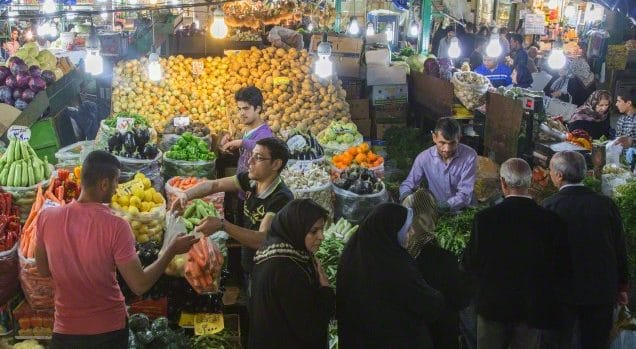Iranians shop at a bazaar in Tehran, April 7, 2015 (Jochen Eckel/DPA/Corbis)
UPDATE 1600 GMT: Iran’s leadership has put out a series of responses, most of them defiant, to the imposition of comprehensive US sanctions.
President Hassan Rouhani told directors and deputies of the Economy Ministry:
We should break the sanctions very well, and we will do that.
With the help of the people, and the unity that exists in our society, we have to make the Americans understand that they must not use the language of force, pressure, and threats to speak to the great Iranian nation. They must be punished once and for all.
Rouhani did not specify the counter-measures that would “punish” the US. Instead, he distorted the US granting of waivers to eight countries, exempting them from American punishment if they reduced imports of Iranian oil — while not enforcing a total cut-off.
They saw that they couldn’t replace [Iranian oil]. And even assuming they did not concede defeat and did not grant waivers to countries, we would still be able to sell our oil [because] we have adequate capabilities to do that.
Despite the European Union being unable to provide guarantees for trade and investment — with large firms suspending links with Tehran — the President continued his appeal to Europe: “Today, we are not the only ones who are angry at US policies; even European businesses and governments are angered by US policies, too.”
Economy Minister Farhad Dejpasand insisted Iran has “a serious plan” to counter the sanctions.
He said the details could not be set out, but indicated that it will include privatizing state assets to raise capital for development.
Dejpasand said the plans would also pursue good governance, mechanisms for improving the business environment, incentives to encourage investment, and projects to address unemployment.
Foreign Minister Mohammad Javad Zarif took a more conciliatory path, saying Tehran is open to talks about a new nuclear agreement if the Trump Administration changes its approach.
In an interview with USA Today, Zarif said Iran will consider diplomacy if there are “foundations for a fruitful dialogue” with “mutual respect”.
But speaking to Parliament, Zarif joined Rouhani in striking a tough pose: “Today, we can see, that, by the grace of God, the JCPOA [nuclear deal] was so much in favor of Iran’s interests that America withdrew from it scandalously.”
Comprehensive US sanctions have been imposed on Iran.
The sanctions, which include restrictions on energy and financial sectors, were ordered by Donald Trump in May as he withdrew the US from the July 2015 nuclear deal between Tehran and the 5+1 Powers (US, UK, France, Germany, China, and Russia).
The new sanctions add 300 individuals and companies to a US blacklist. They include entities in oil, shipping, insurance, and banking.
EA on Monocle 24: US Sanctions v. Iran
The Trump Administration has said that its goal is to eliminate Iran’s oil exports, which provide almost half of the Government’s revenues. Last week the Administration granted waivers for eight countries to continue some purchases — India, for example, will cut purchases by 1/3 through March — to guard against an immediate spike in the global oil price. Other countries receiving sanctions include China, Iran’s largest customer; South Korea; Japan; and Turkey/
Iran’s oil exports are already down 40% since April. Long-term problems with production, investment, trade, and employment have been exacerabated.
The Iranian rial, which has lost about 70% in value this year, has lost 3% this morning. It is currently at 149,000:1 v. the US dollar.
The Supreme Leader insisted on Saturday that “in this 40-year-old challenge” — since the 1979 Islamic Revolution — “the American side has been defeated and the side of the Islamic Republic has been victorious”. He said his “Resistance Economy” for self-sufficiency will prevail.
Iran Daily, Nov 4: Supreme Leader on Sanctions — “US is Always Defeated”
In a sign of defiance, the Guardian Council has rejected a Parliamentary bill for Iran’s accession to an international convention against finance of terrorism.
The Majlis agreed last month to Iran joining the Financial Action Task Force, but hardliners objected that the terms could affect Tehran’s relationship with groups such as Lebanon’s Hezbollah.
As part of negotiations with Iran over trade and investment links, the European Union has sought the Islamic Republic’s inclusion in the FATF.

